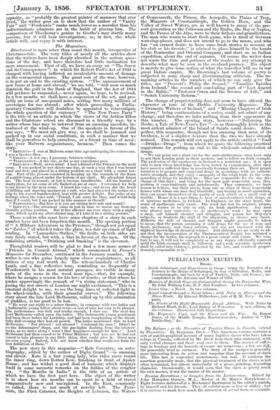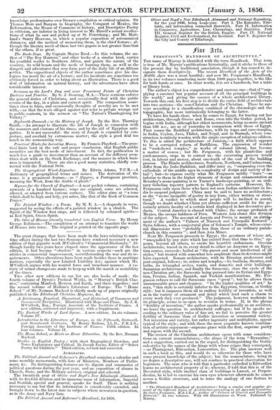PUBLICATIONS RECEIVED.
Boons.
Inside Sebastopol, and Experiences in Camp : being the Narrative of a Journey to the Ruins of Sebastopol, by way of Gibraltar, Malta, and Constantinople, and back by way of Turkey, Italy, and France ; ac- complished in the Autumn and Winter of 1145.
Memoirs of British Generals distinguished during the Peninsular War, By John William Cole, H. P. 21st Fusiliers. In two volumes.
Laura Gay : a Novel. In two volumes.
Brazil viewed through a Naval Glass ; with Notes on Slavery and the Slave-Trade. By Edward Wilberforce, late of H. M. Navy. In two .parts.
The Works of the Right Honourable Joseph Addison. With Notes by Richard Hurd, D.D., Lord Bishop of Worcester. A new edition, in six volumes. Illustrated with Engravings.
The Emperor's Vigil and the Waves and the War. By Ernest Jones, of the Middle Temple, Barrister-at-law, Author of " The Battle-Day," &o.
The Refugee ; or the Narrative of Fugitive Slaves in Canada, related by Themselves. By Benjamin Drew.—This American volume contains a sort of autobiographical account of many fugitive slaves who have taken refuge in Canada, collected by Mr. Drew from their own statement, with only verbal changes and those read over to them. The stories of suffer- ings in bondage and the hazards of escape are numerous ; a few are full, the generality brief to curtness. The story of the escapes is generally more interesting from its action and suspense than the account of slave life. This last is somewhat monotonous, but real. It confirms the assertion generally made, that the physical treatment of the slaves is not often tyrannical, but almost universally of a gross, grinding, degrading character. Occasionally, it would seem that the slave is pretty much his own master, if not the master of his master.
Evening Recreations ; or Samples from the Lecture-room. Edited by John Hampden Gurney, M.A., Rector of St. Mary's Marylebone.— Eight lectures delivered at a Mechanics' Institution in the editor's parish, by himself and his friends. They all exhibit more or less of ability; but it is curious to mark how much the attraction of actual facts or scientific
knowledge predominates over literary compilation or critical opinion. Sir Thomas More and Bunyan in biography, the Conquest of Mexico, the Reformation, the House of Commons in history, and Descriptive Poetry in criticism, are inferior in living interest to Mr. Birrell's actual recollec- tions of what he saw and picked up at St. Petersburg ; and Mr. Mait- land's Starry Heavens, in which a popular exposition of astronomical distances, and the method of measuring them, is the chief feature; al- though the literary merit of these last two papers is not greater than that of the others, if so great.
The Bush-Boys. By Captain Mayne Reed.—In this volume, the au- thor of "The Boy Hunters," and other books of a similar kind, carries his youthful reader to Southern Africa, and paints the nature of the country, its wild beasts and the mode of hunting them, as well as the dangers and adventures that may form part of the daily life of an African settler. The expositional objects of the author sometimes give his dia- logues too much the air of a lecture ; and his incidents are sometimes too -obviously forced in order to bring about an illustration. There is a good deal of information on natural history, and the adventures have often considerable interest.
Sermons on the Lord's Day and some Prominent Points of Christian Doctrine and Practice. By G. J. Gouring, M.A.—These sermons enforce the general duties of Christians, and occasionally deal with the public events of the day, in a plain and earnest spirit. The composition some- times rises to force, and occasionally thoughts of novelty are to be met with,—as that the texts alleged against war refer to private wrongs not to public contests, in the sermon on " The Nation's Thanksgiving for Victory."
Zaphnath-Paaneah ; or the History of Joseph. By the Rev. Thornley Smith.—An attempt to illustrate the life of Joseph in connexion with the manners and customs of his times, and by the aid of Egyptian anti- quities. It is not successful : the story of Joseph is expanded by con- jecture, and overlaid by extraneous matter; the style a good deal too much in the sermonizing way.
Practical Hints for Investing Money. By Francis Playford.—The prac- tical hints land in the safe and proper conclusion, that English public securities are the best mode of investment. In fact, the publication is much less a guide to investment than an account of the different secu- rities dealt with on the Stock Exchange, and the manner in which busi- ness is transacted. There are also a good many statistics, chiefly con- nected with the National Debt.
The Geographical Word-Expositor. By Edwin Adams, T.C.B.—A dictionary of geographical terms and names. The derivation of the name is a prominent feature,—as " Algarve, a Portuguese province, meaning the West, from the Arabic el gharb."
Hymns for the Church of England.—A neat pocket volume, containing upwards of a hundred hymns ; some are original, some are selected, altered, or adapted from various authors. The editor aims at " a tone -which shall be high and holy, yet sober, like that of the Book of Common Prayer."
The Painted Window : a Poem. By M. E. A.—A rhapsody in verse, suggested by seeing the effects of a painted window in a church. The Spirit of the Window first sings, and is followed by coloured spirits— as Red Spirit, Green Spirit.
The Odes of Horace literally translated into English Verse. By Henry George Robinson.—The completion of an attempt to translate the works of Horace into verse. The original is printed on the opposite page.
The great changes that have been made in the laws relating to mari- time affairs during the last two Sessions have rendered necessary a new edition of that gigantic work M'Culloch's " Commercial Dictionary." Al- though hardly two year have elapsed since the appearance of the last edition, it had become " obsolete " in various respects—such are the strides in commercial improvement, notwithstanding the war and its re- quirements. Other alterations have been made besides those in maritime matters, especially the new Limited Liability Act; against which Mr. M'Culloch argues with his wonted force and trenchant manner. A va- riety of minor changes arc made to keep up with the march or mutability of the times.
Two other new editions in our list are also books of mark : the fourth volume of Byron's Poetical Works, in "hurray's British Clas- sics," containing Manfred, Heaven and ELth, and three tragedies ; and the second volume of Hallam's Literature of Europe. The " Home School " of Mr. Norman Macleod is chiefly made up of papers originally published in the Edinburgh Christian Magazine, &c.
A Dictionary, Practical, Theoretical, and Historical, of Commerce and Conunereml Navigation. Illustrated with Maps and.Plans. By J. R. M'Culloch, Esq., Foreign Associate of the Institute of France. A .new edition, corrected and improved ; with a Supplement.
The Poetical Works of Lord Byron. A new edition. In six volumes. Volume IV.
Introduction to the Literature of Europe, in the Fifteenth, Sixteenth, and Seventeenth Centuries. of Henry Hallam, LL.D., F.R.A.S., Foreign Associate of the Institute of France. Fifth edition. In four volumes. Volume II.
The Home School, or Hints on Home Education. By the Rev. Norman Macleod.
Studies in English Poetry ; with short Biographical Sketches, and Notes Explanatory and Critical. By Joseph Payne, Editor of " Select Poetry for Children." Third edition, revised and corrected.
ALMANACKS.
The Political Annual and Reformer's Handbook contains a calendar and some monthly memoranda, with lists of Ministers, Members of Parlia- ment, &c. Its distinguishing features are its digests and summaries of political questions during the past year, and an exposition of abuses in Church, State, and the Military services, original and selected. The twentieth year of Oliver and Boyd's New Edinburgh Almanack, with its fivefold division and its immense mass of information, Imperial and Scottish, special and general, speaks for itself. There is nothing necessary to say but that its information is considerably extended, and brought down to the latest date in subjects where newness is in question, as in the Army and Navy lists.
The Political Annual and Reformer's Handbook, for 18.56. Oliver and Boyd's New Edinburgh Almanack and National Repository, for the year 18.56, being Leap-year. Part I. The Kalendar, Tide- table, and information connected therewith. Part II. Information in Commerce, Agriculture, Law, Chronology, and Statistics. Part III. General Register for the iritish Empire. Part IV. National Register, Civil and Ecclesiastical, for Scotland. Part V. Register for the City and County of Edinburgh.











































 Previous page
Previous page